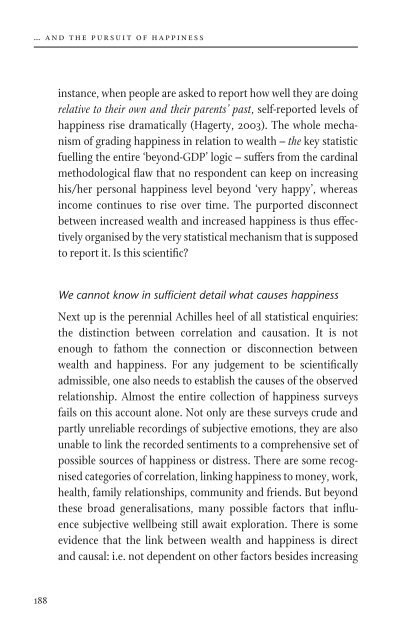… and the Pursuit of Happiness - Institute of Economic Affairs
… and the Pursuit of Happiness - Institute of Economic Affairs
… and the Pursuit of Happiness - Institute of Economic Affairs
You also want an ePaper? Increase the reach of your titles
YUMPU automatically turns print PDFs into web optimized ePapers that Google loves.
<strong>…</strong> <strong>and</strong> <strong>the</strong> pursuit <strong>of</strong> happiness<br />
<strong>the</strong> unbearable lightness <strong>of</strong> happiness policy<br />
instance, when people are asked to report how well <strong>the</strong>y are doing<br />
relative to <strong>the</strong>ir own <strong>and</strong> <strong>the</strong>ir parents’ past, self-reported levels <strong>of</strong><br />
happiness rise dramatically (Hagerty, 2003). The whole mechanism<br />
<strong>of</strong> grading happiness in relation to wealth – <strong>the</strong> key statistic<br />
fuelling <strong>the</strong> entire ‘beyond-GDP’ logic – suffers from <strong>the</strong> cardinal<br />
methodological flaw that no respondent can keep on increasing<br />
his/her personal happiness level beyond ‘very happy’, whereas<br />
income continues to rise over time. The purported disconnect<br />
between increased wealth <strong>and</strong> increased happiness is thus effectively<br />
organised by <strong>the</strong> very statistical mechanism that is supposed<br />
to report it. Is this scientific?<br />
We cannot know in sufficient detail what causes happiness<br />
Next up is <strong>the</strong> perennial Achilles heel <strong>of</strong> all statistical enquiries:<br />
<strong>the</strong> distinction between correlation <strong>and</strong> causation. It is not<br />
enough to fathom <strong>the</strong> connection or disconnection between<br />
wealth <strong>and</strong> happiness. For any judgement to be scientifically<br />
admissible, one also needs to establish <strong>the</strong> causes <strong>of</strong> <strong>the</strong> observed<br />
relationship. Almost <strong>the</strong> entire collection <strong>of</strong> happiness surveys<br />
fails on this account alone. Not only are <strong>the</strong>se surveys crude <strong>and</strong><br />
partly unreliable recordings <strong>of</strong> subjective emotions, <strong>the</strong>y are also<br />
unable to link <strong>the</strong> recorded sentiments to a comprehensive set <strong>of</strong><br />
possible sources <strong>of</strong> happiness or distress. There are some recognised<br />
categories <strong>of</strong> correlation, linking happiness to money, work,<br />
health, family relationships, community <strong>and</strong> friends. But beyond<br />
<strong>the</strong>se broad generalisations, many possible factors that influence<br />
subjective wellbeing still await exploration. There is some<br />
evidence that <strong>the</strong> link between wealth <strong>and</strong> happiness is direct<br />
<strong>and</strong> causal: i.e. not dependent on o<strong>the</strong>r factors besides increasing<br />
wealth (Pischke, 2011). But this undermines, ra<strong>the</strong>r than supports,<br />
<strong>the</strong> <strong>the</strong>sis that we should move beyond wealth to create more<br />
happiness. In any event, <strong>the</strong> limits <strong>of</strong> our statistical comprehension<br />
alone should put any comprehensive happiness agenda on<br />
<strong>the</strong> back burner for now. We simply do not know enough <strong>of</strong> what<br />
drives (un)happiness in a given society.<br />
If people are <strong>the</strong> best judge <strong>of</strong> <strong>the</strong>ir own wellbeing, why<br />
question personal economic behaviour?<br />
<strong>Happiness</strong> surveys are obviously not entirely r<strong>and</strong>om. They<br />
cannot be discarded as irrelevant. Some studies have tried to<br />
verify recordings <strong>of</strong> subjective happiness, through repetitions or<br />
by connecting <strong>the</strong>m to more objective factors. They have found<br />
relevant degrees <strong>of</strong> reliability (Krueger <strong>and</strong> Schkade, 2007;<br />
Oswald <strong>and</strong> Wu, 2010). But <strong>the</strong>se efforts to rationalise <strong>the</strong> irrational<br />
remain sketchy <strong>and</strong> superficial. <strong>Happiness</strong> research essentially<br />
relies on rudimentary surveys because it has nothing better.<br />
People are reckoned to be <strong>the</strong> best available judges <strong>of</strong> <strong>the</strong>ir own<br />
happiness (Frey et al., 2008: ch. 1). This may well be true, but that<br />
does not make it a legitimate basis for a wholesale policy agenda.<br />
Quite <strong>the</strong> contrary: if people’s words on ephemeral feelings are to<br />
be taken for granted, <strong>the</strong>n why question <strong>the</strong> much more reliable<br />
<strong>and</strong> verifiable source <strong>of</strong> <strong>the</strong>ir actions? Why question people’s<br />
consumer decisions <strong>and</strong> desire for prosperity, but accept <strong>the</strong>ir<br />
version <strong>of</strong> happiness? If happiness scholars are right that people<br />
are <strong>the</strong> best judge <strong>of</strong> <strong>the</strong>ir own lives, shouldn’t we rely on <strong>the</strong><br />
preferences revealed by <strong>the</strong>ir judgement to buy <strong>the</strong> next iPhone<br />
(Wolfe, 2008)?<br />
188 189












